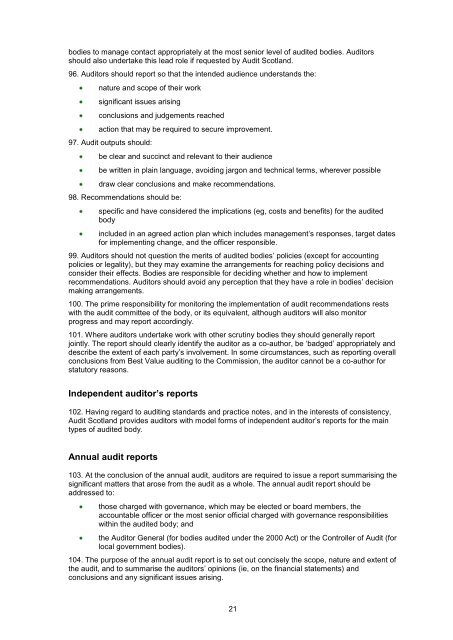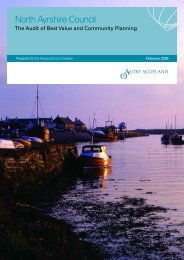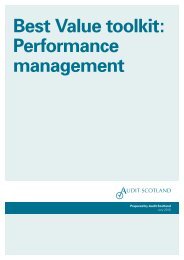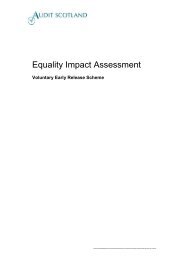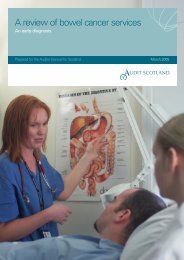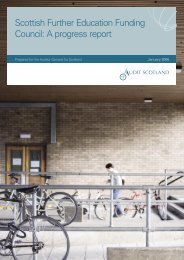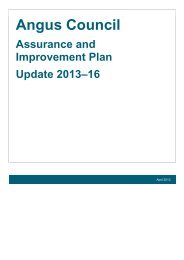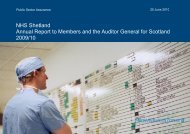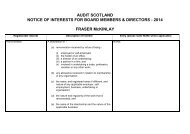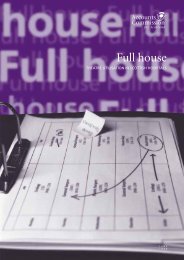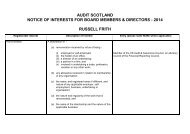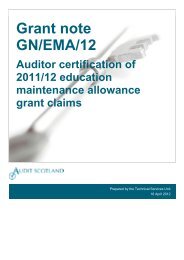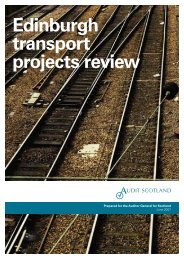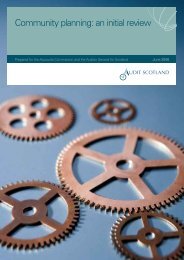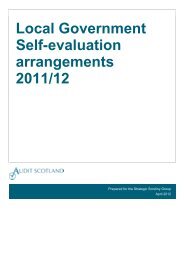odies to manage contact appropriately at the most senior level of audited bodies. <strong>Audit</strong>orsshould also undertake this lead role if requested by <strong>Audit</strong> <strong>Scotland</strong>.96. <strong>Audit</strong>ors should report so that the intended audience understands the:nature and scope of their worksignificant issues arisingconclusions and judgements reachedaction that may be required to secure improvement.97. <strong>Audit</strong> outputs should:be clear and succinct and relevant to their audiencebe written in plain language, avoiding jargon and technical terms, wherever possibledraw clear conclusions and make recommendations.98. Recommendations should be:specific and have considered the implications (eg, costs and benefits) for the auditedbodyincluded in an agreed action plan which includes management’s responses, target datesfor implementing change, and the officer responsible.99. <strong>Audit</strong>ors should not question the merits of audited bodies’ policies (except for accountingpolicies or legality), but they may examine the arrangements for reaching policy decisions andconsider their effects. Bodies are responsible for deciding whether and how to implementrecommendations. <strong>Audit</strong>ors should avoid any perception that they have a role in bodies’ decisionmaking arrangements.100. The prime responsibility for monitoring the implementation of audit recommendations restswith the audit committee of the body, or its equivalent, although auditors will also monitorprogress and may report accordingly.101. Where auditors undertake work with other scrutiny bodies they should generally reportjointly. The report should clearly identify the auditor as a co-author, be ‘badged’ appropriately anddescribe the extent of each party’s involvement. In some circumstances, such as reporting overallconclusions from Best Value auditing to the Commission, the auditor cannot be a co-author forstatutory reasons.Independent auditor’s reports102. Having regard to auditing standards and practice notes, and in the interests of consistency,<strong>Audit</strong> <strong>Scotland</strong> provides auditors with model forms of independent auditor’s reports for the maintypes of audited body.Annual audit reports103. At the conclusion of the annual audit, auditors are required to issue a report summarising thesignificant matters that arose from the audit as a whole. The annual audit report should beaddressed to:those charged with governance, which may be elected or board members, theaccountable officer or the most senior official charged with governance responsibilitieswithin the audited body; andthe <strong>Audit</strong>or General (for bodies audited under the 2000 Act) or the Controller of <strong>Audit</strong> (forlocal government bodies).104. The purpose of the annual audit report is to set out concisely the scope, nature and extent ofthe audit, and to summarise the auditors’ opinions (ie, on the financial statements) andconclusions and any significant issues arising.21
105. The <strong>Audit</strong>or General or Controller of <strong>Audit</strong> (Appendix 3) may follow up matters arising fromaudits and prepare reports for the Scottish Parliament or Accounts Commission, respectively.Annual audit reports are also the main formal source of information for these reports, althoughauditors should always inform <strong>Audit</strong> <strong>Scotland</strong> promptly about any significant matters that arise.106. The annual audit report should form a key part of discussions with audit committees, eitherprior to or as soon as possible after the formal completion of the audit of the financial statements.If an audited body does not have an audit committee then the report should be discussed with anappropriate group of members or the accountable officer and senior management.107. The annual audit report should reflect the responsibilities given to auditors under the Codeand have regard to any other guidance issued by <strong>Audit</strong> <strong>Scotland</strong>. It should:normally include a short executive summary of the most important issues arisingrefer to the respective responsibilities of management and auditorsexpand upon any modified audit opinion, explanatory paragraph or failure to comply witha statutory requirement, included in the independent auditor’s reportrefer to any undue delay in the submission of, or if necessary conclusions about thequality of, the financial statements presented for audit (eg, citing material changesrequired a result of audit)include the auditors’ views on:oooothe quality and appropriateness of corporate governance and internal controlarrangements, including internal auditarrangements for the prevention and detection of fraud, and any significant fraudarisingarrangements for maintaining standards of conduct and the prevention anddetection of corruptionthe body’s financial position.identify any failure by a body to adequately consider relevant national performance auditreports issued by <strong>Audit</strong> <strong>Scotland</strong>refer, if significant, to the outcome of any statutory objections to the accounts (in localauthorities) or correspondence referred to an auditor by <strong>Audit</strong> <strong>Scotland</strong>include, where relevant, the auditor’s view on the appropriateness of arrangements forperformance management and achieving continuous improvement (eg, summarisingprogress against a previous Best Value action plan)refer, where relevant and if significant, to other audit reports, reports issued jointlyfollowing work undertaken with other scrutiny bodies or reports by inspectorates issuedduring the periodgenerally, direct attention to the significant weaknesses or risks identified from the auditand note the action taken or auditors’ recommendations to resolve any such significantissues or areas of concern arising in the period under review and previous periods.108. Annual audit reports should be concerned with achieving change and be accompanied byagreed action plans covering the significant risks identified from the audit and anyrecommendations. They should also refer to any significant issues where agreement was notreached.109. Unnecessarily long reports may not hold the attention of their audience. Annual audit reportsshould not normally include detailed descriptions of management arrangements, budgetaryperformance, financial outturn, or other information that has already been reported to membersby management, unless to set a risk or weakness in sufficient context. Further, the annual auditreport is not simply a summary of all audit activity for the year. A reference in an annual auditreport should not leave a reader unclear about its purpose.22


